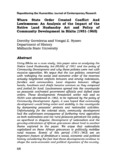Please use this identifier to cite or link to this item:
https://cris.library.msu.ac.zw//handle/11408/1286Full metadata record
| DC Field | Value | Language |
|---|---|---|
| dc.contributor.author | Goredema, Dorothy | - |
| dc.contributor.author | Nyawo, Vongai Z. | - |
| dc.date.accessioned | 2016-05-11T16:03:57Z | - |
| dc.date.available | 2016-05-11T16:03:57Z | - |
| dc.date.issued | 2015-08 | - |
| dc.identifier.issn | 2312-945X | - |
| dc.identifier.uri | http://hdl.handle.net/11408/1286 | - |
| dc.description.abstract | Using Bikita as a case study, this paper aims at analyzing the Native Land Husbandry Act (NLHA) of 1951 and the policy of Community Development and why these policies were met with massive opposition. We argue that the two policies, concerned with reshaping the social and economic order of the reserves actually heightened conflicts between and among individuals, families and communities. Land disputes between village heads, headmen and chiefs became common as they competed and jostled for land. Lawlessness spread into the countryside as peasants confronted government officials and defied state orders. These developments threatened settler rule and so NLHA was abandoned in 1962, to be replaced by the policy of Community Development. Again, it was hoped that community development would bring order and stability in the countryside by dampening peasants‟ protests and nationalist activities.Unfortunately for the colonial state, community development had the unforeseen consequence of furthering rural opposition as both nationalists and the rural peasants perceived the policy as apartheid in disguise. Development of nationalism and the growing articulation of African grievances about land is another theme explored in the paper. We argue that nationalists capitalized on these African grievances to politically mobilize rural masses. Events of this period (1951-1963) are an important feature of Zimbabwe`s social, economic and political history considering the fact that these developments continue to shape the socio-economic and political dynamics of the country. | en_US |
| dc.language.iso | en | en_US |
| dc.publisher | Midlands State University | en_US |
| dc.relation.ispartofseries | Repositioning the Humanities: Journal of Contemporary Research;Vol.1 No.1; p. 68-111 | - |
| dc.subject | Community Development | en_US |
| dc.title | Where state order created conflict and lawlessness: an analysis of the impact of the Native Land Husbandry Act and Policy of Community Development in Bikita (1951-1965) | en_US |
| dc.type | Article | en_US |
| item.openairetype | Article | - |
| item.languageiso639-1 | en | - |
| item.cerifentitytype | Publications | - |
| item.openairecristype | http://purl.org/coar/resource_type/c_18cf | - |
| item.grantfulltext | open | - |
| item.fulltext | With Fulltext | - |
| Appears in Collections: | Research Papers | |
Files in This Item:
| File | Description | Size | Format | |
|---|---|---|---|---|
| 2nd Issue.pdf | Full Text | 14.03 MB | Adobe PDF |  View/Open |
Page view(s)
158
checked on Jan 24, 2026
Download(s)
204
checked on Jan 24, 2026
Google ScholarTM
Check
Items in MSUIR are protected by copyright, with all rights reserved, unless otherwise indicated.



